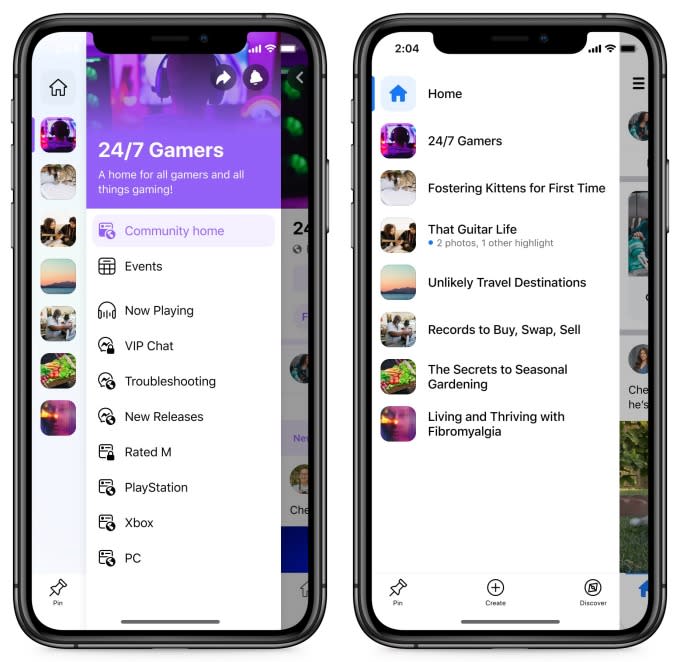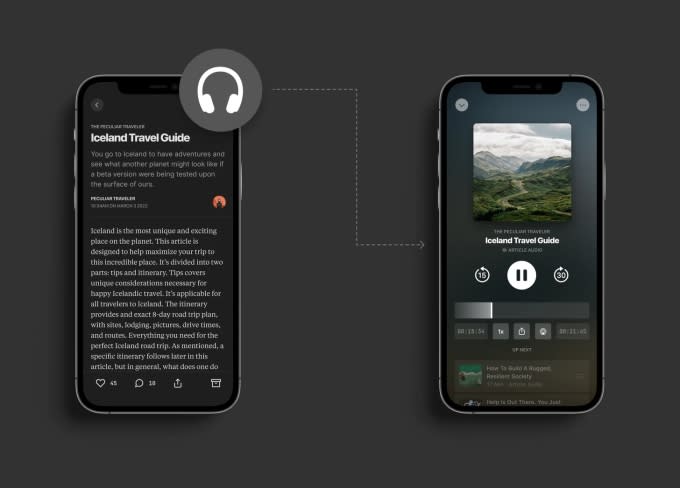This Week in Apps: Period tracking app privacy, Snapchat's paid subscription, calls for TikTok ban
Welcome back to This Week in Apps, the weekly TechCrunch series that recaps the latest in mobile OS news, mobile applications and the overall app economy.
The app industry continues to grow, with a record number of downloads and consumer spending across both the iOS and Google Play stores combined in 2021, according to the latest year-end reports. Global spending across iOS, Google Play and third-party Android app stores in China grew 19% in 2021 to reach $170 billion. Downloads of apps also grew by 5%, reaching 230 billion in 2021, and mobile ad spend grew 23% year over year to reach $295 billion.
Today’s consumers now spend more time in apps than ever before — even topping the time they spend watching TV, in some cases. The average American watches 3.1 hours of TV per day, for example, but in 2021, they spent 4.1 hours on their mobile device. And they’re not even the world’s heaviest mobile users. In markets like Brazil, Indonesia and South Korea, users surpassed five hours per day in mobile apps in 2021.
Apps aren’t just a way to pass idle hours, either. They can grow to become huge businesses. In 2021, 233 apps and games generated over $100 million in consumer spend, and 13 topped $1 billion in revenue. This was up 20% from 2020, when 193 apps and games topped $100 million in annual consumer spend, and just eight apps topped $1 billion.
This Week in Apps offers a way to keep up with this fast-moving industry in one place, with the latest from the world of apps, including news, updates, startup fundings, mergers and acquisitions, and suggestions about new apps to try, too.
Do you want This Week in Apps in your inbox every Saturday? Sign up here: techcrunch.com/newsletters.
TechCrunch+ is also having a sale that will allow subscribers to save 50% on an annual subscription here. More information here.
Top Stories
Consumers react to Roe v Wade by deleting period tracking apps
In the week after the controversial Supreme Court ruling on Roe v Wade, consumers began to lock down access to their non-protected health data in period tracking apps. There was enough app switching taking place to influence the App Store charts, in fact, as users moved both to and from leading app Flo, benefitting rivals like Clue and Eve, which saw installs increase by 2,200% and 83%, respectively.
There are differing opinions on how much concern there needs to be over this period tracking data. Some argue that period tracking app data would not be the primary evidence used if there were to be prosecutions over now criminalized abortions -- an argument, however valid, essentially serves to chastise consumers for reacting in fear by switching to more private apps or deleting them altogether. The bigger picture here is that this data was never HIPPA protected in the first place. And if consumers are reacting with seemingly outsized concern, maybe it's because the government's ruling terrifies them about what the future for this country holds. Maybe it not so crazy to switch back to pen and paper at a time when a rogue court is throwing out half a century of established legal precedent in order to control bodies and invade citizens' privacy.
In any event, many period tracking app providers have been making promises to secure data or introduce new anonymity features. But in an unfortunate twist, it was a newcomer to the market that became the No. 1 app after the ruling -- largely based on promises of end-to-end encryption and not its existing protections. As it turned out, the app -- Stardust, as it was known -- was sharing users phone numbers with a third-party. And after it rolled out its expected encryption later in the week, Stardust was found to be sending the local encryption key back to its servers. In layman's terms, that means whatever was encrypted could now be decrypted. Not a good look.
Now the House Democrats are considering legislation that could protect abortion rights and secure data in reproductive apps.
Snapchat thinks its users will pay for perks with Snapchat+

Image Credits: Snapchat
Like many tech companies, Snapchat has been struggling amid the tougher economic conditions and inflation. The company reported a challenging first quarter where it had additionally cited supply chain disruptions, the war in Ukraine, labor shortages and rising interest rates as contributing factors to its miss on both revenue and earnings in the quarter, and only a small uptick in daily active users. The company is also still dealing with the fallout from Apple's 2021 privacy changes, or ATT (App Tracking Transparency), that impacted its advertising business and revenue.
In the midst of these macroeconomic factors, Snap is trying to navigate new regulations around minor safety, lock down its developer platform, roll out parental controls and remain competitive in a market where much of young people's time spent in apps is now shifting to TikTok and other lightweight networking apps -- or what TechCrunch recently dubbed "homescreen social" apps -- like LiveIn, BeReal and others.
This has resulted in a search for alternative business models beyond advertising, it seems. This week, Snap introduced Snapchat+ -- a $3.99/month subscription that provides access to premium features like being able to pin a friend as a "BFF," see who rewatched a Story and the ability to change the app icon. The move, which was leaked in advance, follows the launches of similar subscription options aimed at power users, like Telegram Premium's recent launch and Twitter Blue. It's hard to say if these investments will pay off in the long run. For now, Twitter continues to make the majority of its revenue from ads and a small bit from data licensing. Telegram's offering is too new to analyze at this time.
Snapchat+, meanwhile, is targeting an audience with perhaps even less to spend on subscription services. Will Snap's high-schooler customers want to use their babysitting money, allowance or income from another minimum wage job or side hustle to gain a few extra features? Were these features actually in high demand, the way Twitter's Edit button was? What's the strategy for enhancing the offering over time? How will Snap evaluate which features to add -- is it analyzing user data or behavior? Will it launch a feedback forum? Or will it just come up with ideas on its own? What percentage of revenue will Snapchat+ need to target to be considered a success? What are the ramifications to Snap if the product fails? Would Snap consider a bundle that combines hardware (like its new drone camera) and software?
For what it's worth, Snap clearly didn't want to invite much scrutiny of this major change to its business model. The company only offered one outlet, The Verge, an interview and said very little in it -- beyond conveying to investors that this won't be a "material new source of revenue." Snap also tried to suggest to the outlet that it had been thinking about subscriptions for over five years, as if the new product was not reactive to the state of its business today.
Of course, tech companies weigh a variety of ideas all the time! But the timing of when they allocate real-world resources to build them is what actually matters. And Snap built a new way to make money at a time when the old way is suffering.
Oh, we're thinking about banning TikTok again?

Image Credits: TechCrunch
The GOP wants to force you to use Reels. OK, that's not quite the story -- but that could be the result.
In actuality, Brendan Carr, the senior Republican on the Federal Communications Commission, wrote to Apple and Google to insist they pull TikTok from their app stores, calling it "a sophisticated surveillance tool" that's harvesting "extensive amounts of personal and private data."
Carr's letter was prompted by the new report from BuzzFeed News which found that ByteDance staff in China had access to U.S. users' TikTok data as recently as January 2022. (Beijing-based ByteDance owns TikTok and its Chinese sister app, Douyin).
Carr demanded the companies respond by July 8 if they didn't comply and why. Specifically, he asked the app stores to explain why they would not penalize an app engaged in "the surreptitious access of private and sensitive U.S. user data by persons located in Beijing" coupled with "TikTok's pattern of misleading representations and conduct."
TikTok has long insisted it stores U.S. users' data in the U.S. itself, with backups in Singapore, and said the data was outside the jurisdiction of China's national security law which requires companies to turn over data to the Communist party if requested. But if TikTok data was being accessed in China, these prior statements seem to be misleading, at best.
The Trump administration had previously tried to ban TikTok by way of an executive order, but was held up in the courts. The Biden administration didn't pursue the matter. But this latest incident now has the GOP interested in a ban once again. Fourteen GOP senators have also issued letters calling for answers from the video app, arguing it's a national security threat.
Of course, it's not that easy to ban TikTok. Last time around, TikTok creators successfully sued to stop the ban, which they said would prevent them from being able to earn a living. Another judge had also blocked Trump's ban, saying the former president had overstepped his authority.
TikTok, meanwhile, has responded to BuzzFeed's reporting by announcing it's moving all U.S. user data to Oracle servers in the U.S., after which it will then delete U.S. users’ data from its own data centers, it says. Sure, Jan.
Weekly News
Platforms: Apple
Apple announced on Thursday developers in South Korea can now use third-party payments in their apps published to the South Korea App Store but will still pay a 26% commission. Plus, just as it tried before with Dutch dating apps, which had also won the right to use third-party payments, Apple said developers will need to submit their revised apps in a separate binary. Dutch regulators had pushed back against that provision, calling it an undue burden on developers, and Apple eventually dropped the requirement to come into compliance. It's unclear how the Korea Communication Commission (KCC) will choose to respond, however.
Apple CarPlay in iOS 16 will support a new feature that allows drivers to pay for gas through a screen in their car using the fuel company's app, instead of having to pay at the pump itself. BP, Shell and Chevron have expressed interest.
Apple clarified the iPad home hub support in iOS 16, after testers noted the iPad could no longer serve as a home hub -- while Apple TV and HomePod devices could. The company explained that the Home app will introduce a new architecture in iPadOS 16 and iPad won't be supported as a home hub with that upgrade. Impacted users can opt to not update their Home app to continue to use their iPad as a home hub.
Apple released the fourth public beta of iOS 15.6 and iPadOS 15.6.
Platforms: Google
Google's Switch to Android app for iOS users is now compatible with all Android 12 phones, instead of just Pixel phones as before. The feature allows users to more easily make the move from iOS to Android by copying over contacts, calendars, photos and videos, and instructing on how to deregister iMessage.
Google settled a lawsuit with Android app developers over fees. The company settled a lawsuit with U.S. app developers who made less than $2 million in Play Store revenue from 2016-2021 by setting aside $90 million in a fund to pay back money to developers. The suit had argued Google gained a monopoly in the Android app distribution space through anti-competitive practices. The law firm said 48,000 U.S. developers are eligible to receive payments from Google.
E-commerce & Food Delivery
Food delivery biz Deliveroo will expand advertising on its app in July, including by adding ads to its order-tracking page as it chases profitability.
Fast food and membership club apps are seeing increased demand amid inflation, Apptopia reports.
TikTok is testing a dedicated “Shop” feed in Indonesia that lets users browse and purchase products from different categories, such as clothing and electronics. Of note, the feed sits on the app's main page alongside its For You and Following feeds, which would be a major change to the product. The TikTok Shop service itself is currently available in select markets, including Indonesia, Vietnam, Singapore and the U.K.
Augmented Reality
Pokémon GO developer Niantic laid off 8% of its workforce, or around 85-90 people, amid the economic downturn. The company also canceled four upcoming projects, including Heavy Metal, a Transformers game that had already entered beta testing; Hamlet, a collaboration with the theater company behind “Sleep No More;” and two other projects known as Blue Sky and Snowball. Niantic has not been able to reproduce the success of its flagship game, having shut down a Harry Potter AR title and so far seen little adoption for its new AR game, Pikmin Bloom. The company is now working on a new AR game, NBA All-World.
Niantic's Lightship is also powering a new "Game of Thrones" app designed to promote HBO's upcoming prequel series "House of the Dragon." The AR app will allow users to hatch a personalized dragon egg and raise their dragon at home. The app, produced by The Mill, will arrive on July 20.
Niantic launched Campfire, a new social app for its community that shows a map of your area with game experiences and activities from friends and other nearby players. The app helps users find local communities, add and manage friends, chat in one-on-one and group messages, join events and more.
Social

Image Credits: Facebook
Facebook takes on Discord. The company this week rolled out new features for Facebook Groups including "Channels," that allow users to connect with one another in smaller groups via chat or audio, similar to Discord, or in interest-based communities. The app will also test a new sidebar that will make it easier for users to find their groups more quickly, with the option to pin favorites to the top.
Facebook also rolled out NFTs. U.S. NFT creators will now be able to display NFTs under a new tab on their profiles. Meta recently launched NFTs on Instagram in May 2022.
Pinterest has a new CEO. The image pinboard and link-saving site's co-founder and CEO Ben Silbermann stepped down after a 12-year run, turning over the reins to Google commerce boss Bill Ready. Previously, Ready ran Google's shopping and payments arm after joining Google from PayPal, which acquired its startup Braintree for $800 million in 2013. Last fall, PayPal had been reported to be considering a Pinterst acquisition.
Instagram rolled out Reels APIs for developers. The new endpoints added to Instagram's developer platform will allow developers to schedule Reels, publish to Instagram Business accounts, access social interaction metrics, reply to or delete comments, hide or unhide comments, disable or enable comments, find public Reels tagged with specific hashtags and identify Reels where an Instagram Business or Creator’s alias has been tagged or @mentioned.
Instagram users can now delete their accounts from within the iOS app. The app has complied with Apple's new policy that states any app offering account creation must also now offer deletion. Instagram, however, puts accounts on hold for a month instead of immediately deleting them. If you log back in at any time, the deletion process is canceled.
Instagram is testing a change that turns all videos into Reels. The company said it's trying to "simplify and improve" the video experience in the app. In reality, the move is yet another effort aimed at helping Instagram catch up with TikTok.
Short-form video app Triller filed for an IPO. The company confidentially filed for a U.S. IPO after ending its $5 billion merger with video ad software provider SeaChange International on June 14.
Messaging
WhatsApp is developing avatars. The Meta-owned company is working on an avatars feature similar to Apple's Memoji or Snap's Bitmoji, that could stand in for the user during video calls.
Streaming & Entertainment
Spotify launched a new personalized playlist option called “Supergrouper” that lets you create your own supergroup consisting of up to five artists. After you create and name your group, Spotify will curate a playlist of songs from the artists you selected, which you can also share on social media.
U.S. artists on Spotify can now use the app's Marquee self-serve ad-buying option to promote releases across 14 markets via the Spotify for Artists dashboard. Marquee first launched in October 2019 but wasn't able to target users outside the U.S. initially.
Twitch added a new Guest Star feature that lets streaming hosts bring up to five guests into a stream and swap them in and out.
Gaming
Meta VR developers call out the company for hypocrisy given its complaints over Apple's App Store fees. The developers are frustrated with Meta's 30% cut of their purchases and 15-30% cut of subscriptions, similar to Apple's. They said Meta CEO Mark Zuckerberg had called Apple's fees "monopoly rents," but his company is doing the same thing.
The WSJ examined the growing complexity of hypercasual games which have begun adding leaderboards, multiplayer formats and in-app purchases to these previously simple games as they look to retain player retention amid market saturation. The games often also use rewarded ads or those that showcase someone playing poorly to encourage users' sense of competition. Other ads will feature gameplay that doesn't exist at all.
Travel & Transportation
Car rental apps in the U.S. hit all-time highs for new installs and MAUs in May, Apptopia found, indicating pent-up travel demand and possibly a desire to avoid the chaotic airline issues. New installs are projected to increase 27% YoY in Q2 2022, and MAUs are expected to increase 19.4%. Enterprise (39.6%), Hertz (36.8%) and Turo (34.3%) are growing MAUs the fastest, the firm said.
Reading & News
Storytelling community Wattpad launched a creator program that offers writers up to $25,000 in compensation. There's also a new metric called "Engaged Readers" that helps track readers' interest in stories and a creator portal where writers can get other tips about improving their content.
Substack has begun to convert some writers’ text into audio automatically using text-to-speech technology. Readers using the Substack iOS app will have the ability to hear posts read aloud as a result.

Image Credits: Substack
Government & Policy
Russia is issuing fines to companies that aren't storing Russian citizens' personal data in the country. Google, Twitch, Pinterest, Airbnb and UPS have already been fined, and the government has opened cases against LikeMe and Apple as well.
Security & Privacy
Google notified Android users who were compromised by Hermit government-grade spyware which targeted victims in Kazakhstan and Italy. Google also examined the Hermit iOS app which is sideloaded onto devices and included six exploits, including two zero-days. Apple said it revoked all known accounts and certificates associated with the spyware campaign.
T-Mobile launched a service called App Insights that allows marketers to target wireless customers based on the apps they have installed. Customer data is anonymized and pooled together with others with similar interests and behaviors. And users are opted in by default.
Instagram is accused of continuing to allow a man accused of selling photos of children to pedophiles to maintain his account and share images for two months following his arrest, Forbes reports.
Google updated its password manager for Chrome and Android, offering a way for users to manually enter new passwords across platforms, as well as a new unified user experience that automatically groups multiple passwords for the same sites or apps together, and a new shortcut on the Android home screen to get access to these passwords. The iOS Chrome app will also be able to generate strong passwords for you.
Funding and M&A
💰 Data analysis startup Zing Data raised $2.4 million in seed funding led by Kindred Ventures for a mobile app that lets business users work with data wherever they are in an accessible way. The product can connect with a variety of popular data sources, including Snowflake, Trino, Google BigQuery and Google Sheets, as well as databases like Postgres and MySQL. Users then choose a dataset and some fields to display, then can manipulate the data to see different views and can share charts with others.
💰 London-based Birdie, a provider of digital tools for in-home care, raised $30 million in Series B funding led by Sofina, which will be used to scale the business in Europe. The SaaS company works with 700 care businesses that deliver millions of visits per month to around 35,000 recipients and 8,000 family members. Its services are available through both an iOS and Android app.
💰 London-based fintech Cleo, an AI-powered app for financial assistance, raised $80 million in Series C funding led by Sofina. The app targets the U.S. market's Gen Z users with budgets and savings guidance and education.
💰 New Delhi-based digital bank Progcap raised $40 million in a Series C extension, valuing the business at $600 million, up 3x since September 2021. Creation Investments and Tiger Global led the round. The app serves 700,000 small retailers across hundreds of Indian cities and towns.



